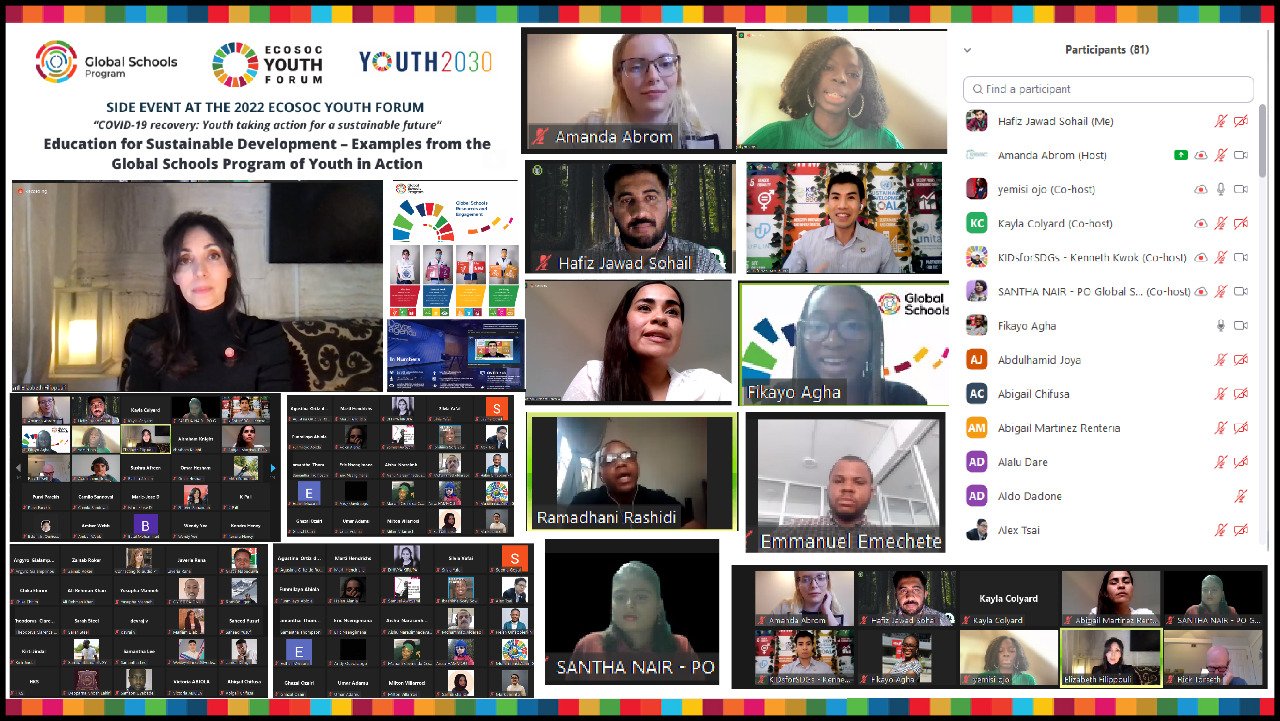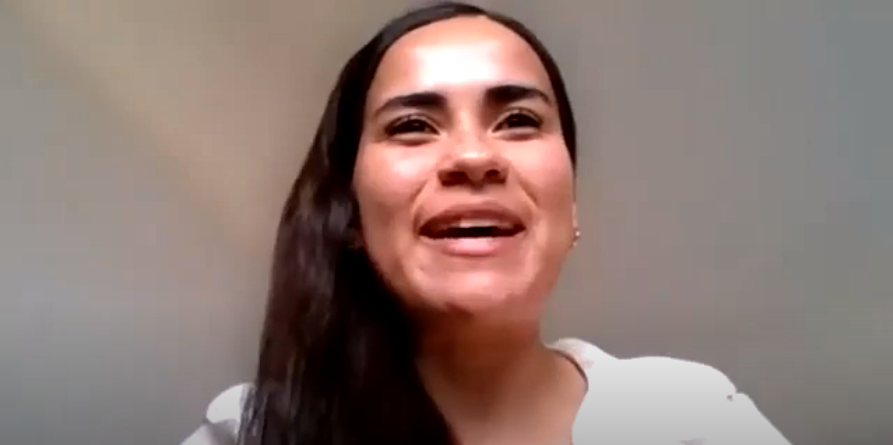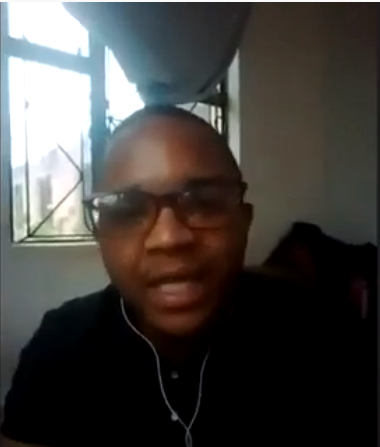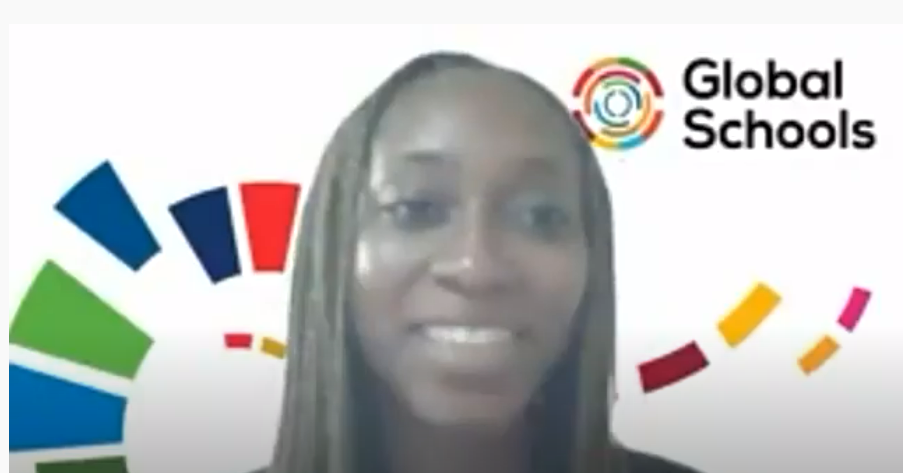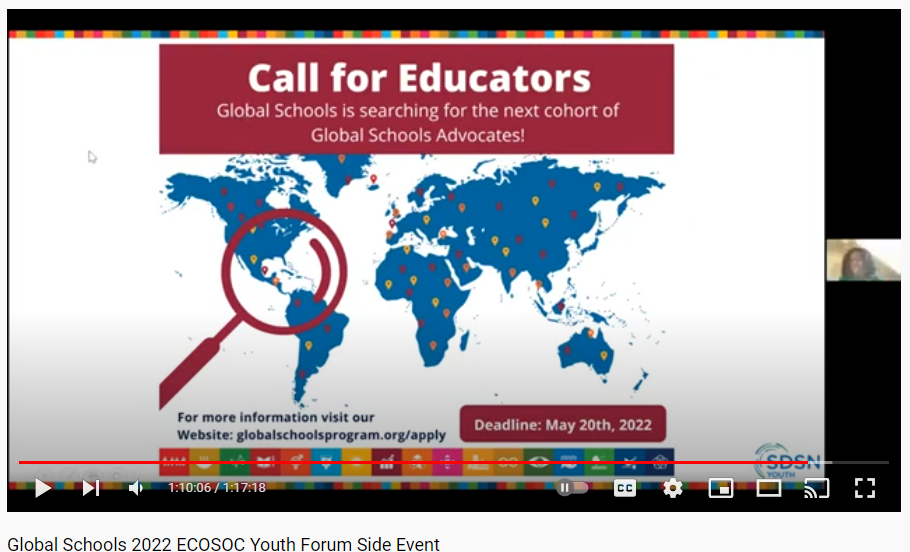Global Schools hosts a side event on SDG 4 at the ECOSOC Youth Forum
By Abigail Chifusa, Global Schools Project Officer
On Monday 18th April, 2022, Mission 4.7 partners the Global Schools Program held a virtual 2022 Economic and Social Council (ECOSOC) youth forum Side Event on Quality Education (SDG 4). The objective of the side event was to share best practices, lessons learned, and solutions adopted by the Global Schools Program and discuss creative and innovative ideas to implement Education for Sustainable Development at the local and grassroots level. The session was moderated by Oluwayemisi Ojo, Global Schools Project Officer.
Global Schools hosted Ms. Elizabeth Filippouli, who is the founder of the Global Thinkers Forum, as the Keynote speaker. During her presentation, Ms. Filippouli highlighted the importance of the role of education and knowledge. She believes in lifelong education and that if everyone can have access to knowledge, then that opportunity must be seized.
She emphasized the importance of students being more equipped effectively to navigate the social environment and economic problems of the 21st century. She also stated that knowledge must be offered to young people worldwide because it is the most important gift that can be used to help combat poverty; to empower youth to reach their dreams; to learn to appreciate the beauty of diversity; to understand the importance of gender equality; to become more tolerant and understanding.
Additionally, Ms. Filippouli mentioned that she believes in knowledge in its deeper sense, not that of fragmented information, but the knowledge that comes along with critical thinking, and so everyone must cultivate critical thinking among youth. She noted the world must nurture deeper perception of the complexities of the unpredictable world we live in. It is only then that knowledge becomes wisdom.
Furthermore, Ms. Filippouli shared educative information about the history of the challenges the world faced 22 years ago. She explained that the world as a global community then, seemed to have found a shared vision that was guided by the Commonwealth to prosper in peace together. In the same year in 2000, the world leaders recognized the fact that accountability was to be prioritized, poor economies, underprivileged societies, disadvantaged communities of people were not to be left behind. To address those issues, the United Nations (UN) announced the millennium goals with the intention to bring positive change in the lives of billions of people. She further explained that in 2015, national leaders, as well as global societies, revisited the challenges the world was facing and decided to announce a new group of urgent matters around which the 17 Sustainable Development Goals (SDGs) have been structured, with the goal to implement change by the year 2030.
After the keynote, Global Schools Advocates and alumni Abigail Martinez Reteria, Kenneth Kwok, and Ramadhani Ally Rashidi shared their stories and experiences about their work on Quality Education (SDG 4).
Abigail Martinez Reteria is Global Schools Advocate alumni from Mexico who volunteered as an Advocate for the Global program for 6 months in 2021. She explained the Global Schools Advocate training gave her an opportunity to implement sustainable development in the Mexican education system.
Abigail worked in a middle school between the border of Mexico and the states, which is an area that faces a myriad of social issues, especially regarding gender equality and the environment. She added that the area experiences water shortages, as well as struggles with interracial policies, international markets, and other economic and social issues.
However, the implementation of Education for Sustainable Development (ESD) was an essential aspect at Abigail’s former school. She taught English literacy and implemented ESD through monthly projects such as essay writing; therefore, during her presentation, she gave an example of how she tasked her students to write on a polarized topic. Her personal anecdote revealed the importance of how educators should consider their students’ feelings and fears so that they know how to implement appropriate conversations and activities in their different curriculum.
Furthermore, Abigail shared her experience of being in contact with other international advocates. She implemented several activities with Advocates from the Philippines, Nigeria, and Latin America, whom she invited to her classroom through a digital platform. The Advocates discussed different issues that made her students realize that they were not the only ones experiencing the challenges.
Lastly, she added that belonging to the Global Schools Program gave her the opportunity to develop new literacies through lesson plans that she contextualized into the global and local context. Abigail realized that as an Advocate, she educated her community through the learners who would share the knowledge she imparted to them with their families.
Kenneth Kwok was the second panelist that participated in the SDG 4 panel. Kenneth Kwok was part of the 2021 Global Schools Advocates cohort and now serves as a mentor for the cohort based in Asia.
During his presentation, Kenneth shared that he found his purpose in education and working with SDGs and empowering youths with entrepreneurial knowledge. Therefore, he thanked the Global Schools Program for showcasing the work KIDsforSDGs do in driving entrepreneurial thinking SDG action in youth.
He emphasized that the education systems around the world must not be driven by grades attained in classrooms but instead discover innovative ideas of what they will do with the knowledge acquired from their lessons.
Furthermore, Kenneth shared a slideshow of the 5Ps of empowering youth social entrepreneurs that were derived from his article.
Ramadhani Ally Rashidi is a Global Schools Advocate from Tanzania and a mentor for the Global Schools Advocates cohort. He volunteers as a teacher in different schools within his country.
In his presentation, Ramadhani mentioned that as a Global Schools Advocate, he has been completing solution-based projects with his learners, most of which are available in Global Schools Case Study Guidebook. He explained that he uses a literacy approach for the students who can not read and write. He also introduced talent development activities to the students.
He has created clubs for students to raise awareness on various issues and introduced a practical way of teaching that instills entrepreneurial skills in learners.
Ramadhani highlighted that his schools recently launched a project on menstrual education for girls.
At the end of their presentations, the three Advocates answered questions from the panelists during the question and answer session regarding their advocacy work.
To conclude the event presentations, Global Schools Project Officer, Fikayo Agha officially announced the opening for application for the next cohort of Global Schools Advocates, which will close on May 20th, 2022.
To apply for the next cohort of the Advocates program, please visit globalschoolsprogram.org/apply.
Watch the full recording below.

